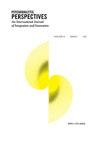A Review of Borderline Bodies: Affect Regulation Therapy for Personality Disorders by Clara Mucci
Q4 Psychology
引用次数: 0
Abstract
In Borderline Bodies: Affect Regulation for Personality Disorders, Clara Mucci has set herself a monumental task: the integration of neuroscience, attachment theory, infant research, and psychoanalysis in one volume that comprehensively addresses psychodynamic work with borderline patients. This impressive book is complex, scholarly, dense, and multi-layered, and offers much that a relational psychoanalytic reader will find useful and thought-provoking. The overused word “interdisciplinary” is unavoidable when talking about Mucci’s work. Mucci has an intimidating resume: having reached the rank of full professor of English literature and Shakespeare studies at the University of Chieti (by way of Atlanta, where she earned a PhD in literature and psychoanalysis), she later retrained in clinical psychology and psychotherapy, earning a second doctorate and becoming a faculty member in Chieti’s department of psychology, as well as a practicing psychoanalyst and supervisor. Currently, she is full professor of psychology at the University of Bergamo, where she heads the doctoral program. The author of several monographs on Shakespeare, psychoanalysis, and literary theory, she has more recently published widely on trauma, mourning, and forgiveness. In a previous volume, Beyond Individual and Collective Trauma: Intergenerational Transmission, Psychoanalytic Treatment, and the Dynamics of Forgiveness (Mucci, 2013), she offers a synthesis of contemporary approaches to the understanding and treatment of trauma, and she has also co-edited, with Giuseppe Cravaro, a collection of essays on Mauro Mancia’s notion of the “unrepressed unconscious” and implicit memory. Borderline Bodies, like herClara Mucci的《边缘体:人格障碍的情感调节疗法》综述
在《边缘身体:人格障碍的情感调节》一书中,Clara Mucci为自己设定了一项艰巨的任务:将神经科学、依恋理论、婴儿研究和精神分析整合在一本书中,全面解决边缘患者的心理动力学工作。这本令人印象深刻的书是复杂的、学术性的、密集的、多层次的,提供了很多关系精神分析读者会发现有用和发人深省的东西。在谈论穆奇的作品时,“跨学科”这个词被过度使用是不可避免的。穆奇有一份令人生畏的简历:她在基耶蒂大学(途经亚特兰大,在那里她获得了文学和精神分析博士学位)获得了英国文学和莎士比亚研究的正式教授军衔,后来她接受了临床心理学和心理治疗的再培训,获得了第二个博士学位,并成为基耶蒂心理学系的一名教员,同时也是一名执业精神分析师和主管。目前,她是贝加莫大学的心理学正教授,负责该校的博士项目。作为几本关于莎士比亚、精神分析和文学理论的专著的作者,她最近广泛发表了关于创伤、哀悼和宽恕的文章。在上一卷《超越个体和集体创伤:代际传播、精神分析治疗和宽恕的动力》(Mucci,2013)中,她综合了当代理解和治疗创伤的方法,她还与朱塞佩·克拉瓦罗共同编辑了,一本关于毛罗·曼西亚“无意识”和内隐记忆概念的散文集。像她一样的边缘身体
本文章由计算机程序翻译,如有差异,请以英文原文为准。
求助全文
约1分钟内获得全文
求助全文

 求助内容:
求助内容: 应助结果提醒方式:
应助结果提醒方式:


